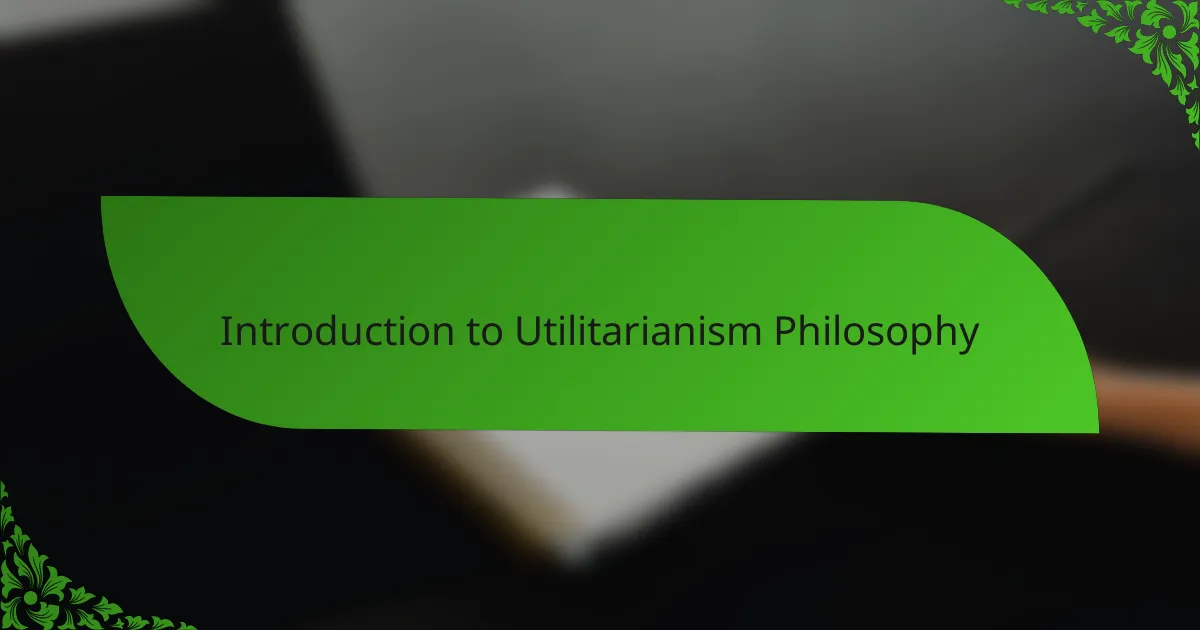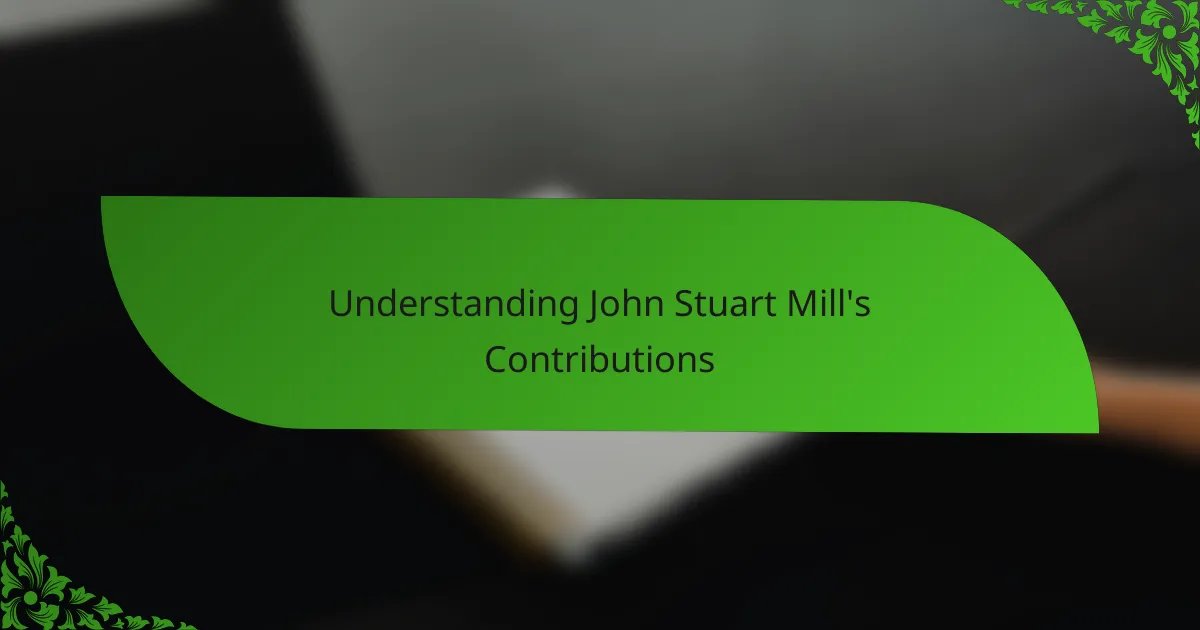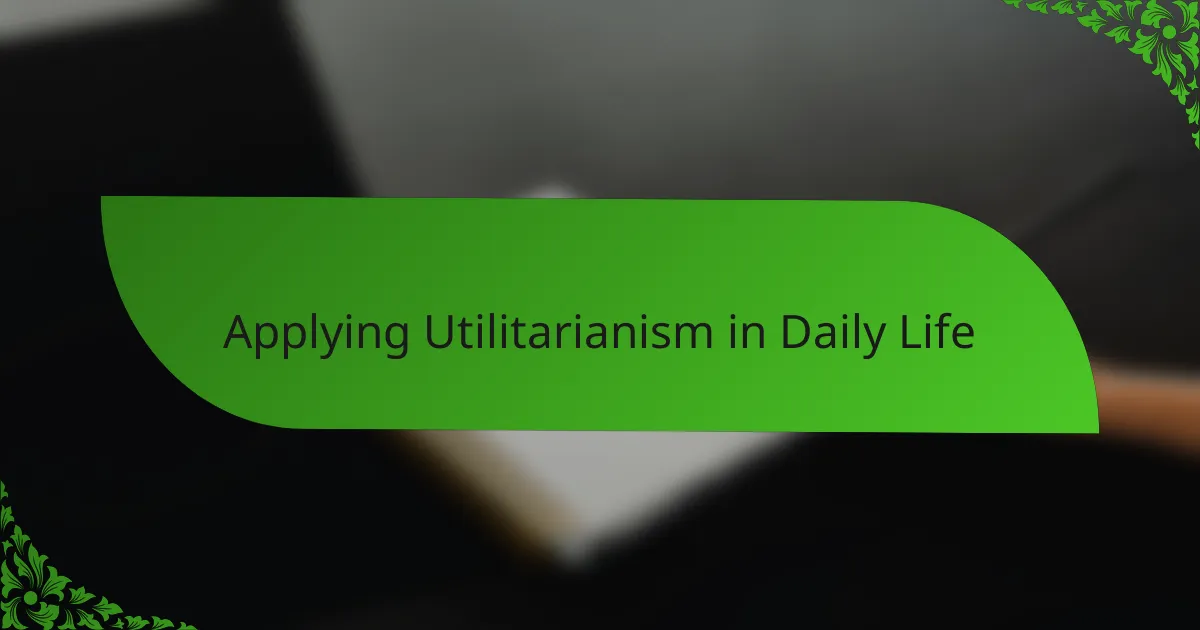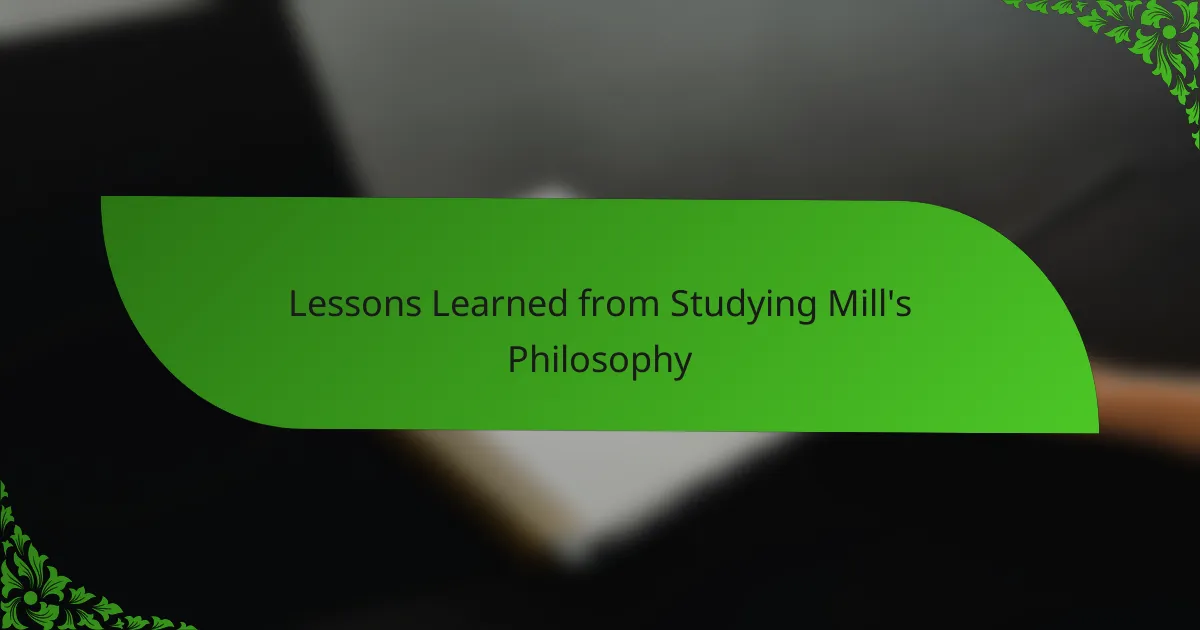Key takeaways
- Utilitarianism emphasizes actions that promote the greatest happiness for the greatest number, shifting focus from intentions to outcomes.
- John Stuart Mill introduced the distinction between higher and lower pleasures, underscoring the importance of quality over quantity in happiness.
- Applying utilitarianism involves balancing individual liberties with the well-being of the community, which enhances personal fulfillment and responsibility.
- Challenges in utilitarianism include measuring happiness and reconciling individual rights with the greater good, highlighting the complexity of ethical decision-making.

Introduction to Utilitarianism Philosophy
Utilitarianism always struck me as both simple and profound—at its core, it asks a straightforward question: What action leads to the greatest happiness for the greatest number? This idea, focusing on outcomes rather than intentions, challenged me to think differently about moral choices I had taken for granted.
One thing I found fascinating is how this philosophy measures ethics by pleasure and pain, almost as if life were a balancing act, constantly weighing happiness against suffering. Have you ever paused to consider how many everyday decisions are influenced by this silent calculation? Recognizing this made the theory feel less abstract and more intimately connected to real life.
As I delved deeper, I realized utilitarianism isn’t just cold logic—it’s deeply human, insisting that our actions matter because they affect others’ well-being. This perspective can make us more empathetic, pushing us to ask not only what benefits me but what benefits all. It’s a perspective that, once embraced, invites reflection on how interconnected we truly are.

Understanding John Stuart Mill’s Contributions
John Stuart Mill’s contributions transformed my understanding of utilitarianism by adding a crucial layer: the quality of happiness matters, not just the quantity. Unlike earlier thinkers, Mill argued that intellectual and moral pleasures are superior to mere physical ones, which made me rethink how we evaluate what truly makes life fulfilling.
I remember grappling with Mill’s nuanced approach—he didn’t dismiss pleasure altogether but distinguished which pleasures promote deeper well-being. This felt more humane and realistic to me, as if he acknowledged our complexities rather than boiling everything down to simple calculations.
Have you ever wondered how a philosophy can balance individual freedom with the happiness of the majority? Mill’s emphasis on liberty showed me that protecting personal freedoms enhances overall happiness, revealing a richer, more compassionate utilitarianism than I first imagined.

Key Principles of Mill’s Utilitarianism
Mill’s utilitarianism rests on the principle that actions are right if they promote happiness and wrong if they produce the opposite. What struck me was how Mill didn’t just focus on any happiness, but the “greatest happiness” for the “greatest number.” It made me ask myself, how do we measure happiness in such a way that respects both individuals and the community?
Another key aspect I found compelling is Mill’s differentiation between higher and lower pleasures. He argued that intellectual and moral pleasures are more valuable than mere physical ones. This idea challenged me to think beyond simple gratification and consider what kinds of happiness lead to a richer, more meaningful life.
Mill also emphasized liberty as essential to utilitarianism—it’s not just about the end result but ensuring that personal freedom flourishes. This made me reflect on the delicate balance between respecting individual rights and seeking the common good. How often do we overlook this interplay when making ethical decisions? I realized this principle brings a thoughtful depth to utilitarianism that resonates with real-world complexities.

Applying Utilitarianism in Daily Life
Applying utilitarianism in daily life quickly became a way for me to evaluate choices beyond just personal convenience. For example, when deciding whether to help a colleague with a challenging project, I started thinking not just about my time but about the collective benefit—how my assistance could ease their stress and boost the team’s overall success. It made everyday interactions feel more meaningful.
I also noticed that applying Mill’s idea of higher pleasures helped me prioritize activities that bring lasting fulfillment rather than fleeting joy. Instead of scrolling mindlessly on my phone, I’d choose to engage in thoughtful conversations or creative pursuits, aware that these contribute to a deeper happiness for myself and those around me. Have you ever experienced that subtle satisfaction after investing time in something intellectually or morally uplifting?
Of course, this approach sometimes brings tough questions: What if my effort to maximize happiness conflicts with someone else’s immediate desires? Navigating those moments reminded me how utilitarianism isn’t about simple calculations but about empathy and balance. I came to appreciate how this philosophy encourages us to weigh outcomes carefully, keeping in mind both individual freedoms and the greater good in our everyday decisions.

Reflecting on Personal Experiences with Utilitarianism
Reflecting on my own experiences, I recall a time when I had to choose between speaking up in a group discussion or staying silent to avoid conflict. Applying utilitarian thinking, I asked myself which option would bring the greatest good for everyone involved, not just protect my comfort. That moment taught me how utilitarianism pushes beyond self-interest toward a broader sense of responsibility.
There was also an instance when I volunteered at a community event, expecting personal satisfaction but ending up deeply moved by how collective joy multiplied through simple acts of kindness. It made me realize that utilitarianism isn’t just an abstract theory; it’s lived in these everyday moments where small efforts ripple into greater happiness. Have you noticed how helping others often circles back, enriching your own sense of meaning?
Sometimes, though, I struggle with utilitarianism’s demand to prioritize the majority’s happiness, especially when individual needs feel urgent. It raises tough questions about fairness and sacrifice. Yet, these challenges have deepened my appreciation for Mill’s emphasis on liberty—reminding me that true happiness involves respecting both individual dignity and the community’s well-being.

Challenges Faced While Exploring Utilitarianism
Exploring utilitarianism through Mill wasn’t without its hurdles. One challenge I often faced was grappling with the idea of measuring happiness—how do we truly compare one person’s joy to another’s? It felt like trying to weigh something invisible, which made applying the theory in real situations quite tricky.
Another struggle emerged when I wrestled with the tension between individual rights and the greater good. Have you ever felt torn between standing up for yourself and doing what benefits most people? Mill’s insistence on liberty adds a compassionate layer, yet balancing it in practice sometimes felt like walking a philosophical tightrope.
Sometimes, I found myself overwhelmed by utilitarianism’s demand for impartiality. It asks us to look beyond personal attachments, but emotionally, this can be draining. How do you prioritize strangers’ happiness when those closest to you need so much? These tensions made me appreciate the depth and complexity behind what initially seemed like a straightforward ethical approach.

Lessons Learned from Studying Mill’s Philosophy
Studying Mill’s philosophy taught me that ethics isn’t just about actions but about the quality behind those actions—what kind of happiness are we truly promoting? I found myself reflecting deeply on moments when I had to choose between quick pleasures and long-lasting fulfillment, realizing Mill’s emphasis on higher pleasures adds richness to moral thinking.
I also learned that protecting individual liberty isn’t just a bonus but essential to achieving the greatest happiness. This challenged my initial assumption that maximizing happiness might override personal freedoms; instead, Mill’s ideas made me see freedom as a vital ingredient, not a casualty, of ethical decisions.
Have you ever struggled with balancing your own needs against the wider good? I certainly have, and grappling with Mill’s utilitarianism highlighted how this balance is fragile yet crucial—reminding me that true moral reflection demands empathy, nuance, and ongoing effort rather than easy answers.